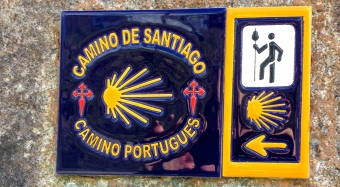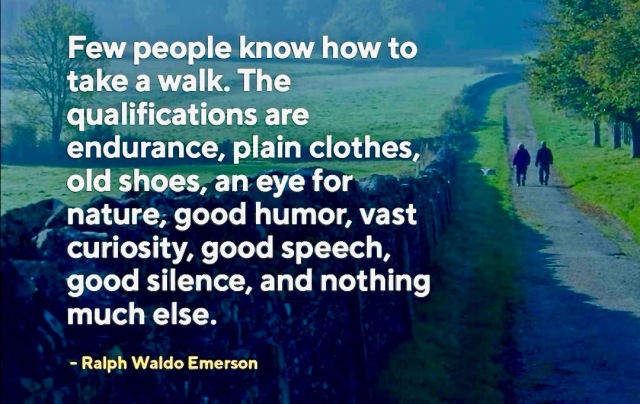 I have been home for a while and reflecting on my recent trip, the end of a ten year/5000 km series of four pilgrimages. I’m asked, and I ask myself, what did I get out of it? It’s not like I have, for a decade, carried an expectation of some grand epiphany or some other-worldly instant conversion like Saul/Paul on the road to Damascus. Yet something should have happened after all those miles, all those days alone, all that time away from the worldly distractions; something worth mentioning. Something kept me at it. The good news is that there has been transformation – not fireworks in the sky – but slow, gradual, meaningful and hopefully permanent transformation of the way I live my life.
I have been home for a while and reflecting on my recent trip, the end of a ten year/5000 km series of four pilgrimages. I’m asked, and I ask myself, what did I get out of it? It’s not like I have, for a decade, carried an expectation of some grand epiphany or some other-worldly instant conversion like Saul/Paul on the road to Damascus. Yet something should have happened after all those miles, all those days alone, all that time away from the worldly distractions; something worth mentioning. Something kept me at it. The good news is that there has been transformation – not fireworks in the sky – but slow, gradual, meaningful and hopefully permanent transformation of the way I live my life.
 All four of my walks have been firmly grounded in religious traditions and histories, Catholicism and Buddhism. I struggled with both but find myself now more firmly agnostic than a decade ago.
All four of my walks have been firmly grounded in religious traditions and histories, Catholicism and Buddhism. I struggled with both but find myself now more firmly agnostic than a decade ago.
I simply wasn’t able to grasp one of the fundamentals of Buddhism – meditation; I was too restless for Buddhist philosophy. I failed the test of ‘can he sit still?’.
 As for Catholicism, my personal experiences with organized Christian traditions and my jaded view of the impact of Christianity on people throughout history has made rethinking my beliefs a truly uphill battle, Sysiphus would have had an easier task.
As for Catholicism, my personal experiences with organized Christian traditions and my jaded view of the impact of Christianity on people throughout history has made rethinking my beliefs a truly uphill battle, Sysiphus would have had an easier task.
There was, then, no profound religious epiphany. I do admit to a bit of a crack in my armour; a regular part of my walking routine involved stopping at churches along the way, lighting a candle and saying a small prayer of sorts for past friends/family.
 There is a long tradition of serious philosophers rhapsodizing about the impact walking has had on their thoughts about the central question of philosophic inquiry. How do we live the good life? Walking seems conducive to thinking big thoughts. Philosophers since the Ancient Greeks have given considerable time and thought on how to live the good life by thinking while walking; the process seems to have failed me, I don’t feel much wiser about how to live the good life. As one Saturday Night Live actor said, “Deep down, I’m quite shallow.” – maybe that fits, or I can’t think deeply and walk at the same time.
There is a long tradition of serious philosophers rhapsodizing about the impact walking has had on their thoughts about the central question of philosophic inquiry. How do we live the good life? Walking seems conducive to thinking big thoughts. Philosophers since the Ancient Greeks have given considerable time and thought on how to live the good life by thinking while walking; the process seems to have failed me, I don’t feel much wiser about how to live the good life. As one Saturday Night Live actor said, “Deep down, I’m quite shallow.” – maybe that fits, or I can’t think deeply and walk at the same time.
Yet I haven’t felt that I have missed out on anything; I don’t regret my time spent, I don’t look back and feel it was time wasted. I have got value out of these pilgrimages.
I think I’ve actually pilgrimaged all there is to get from these pilgrimages. The beauty of nature, the kindness of strangers, the serenity of solitude, the comfort of being comfortable in my own skin, the beneficial impact on my health and well-being, the Tender Mercies offered without hesitation to a pilgrim stranger, seeing others close up and personal; all these and more have come my way on the paths I’ve walked. I cherish them all as gifts of the pilgrim path.
Having said all that, I have been thinking these past few miles. I have been thinking about stoicism. I have been thinking about how walking these long pilgrim walks over the past decade have helped me progress towards becoming a better stoic.
What’s stoicism? Like most philosophies, it’s a pretty flexible concept, open to interpretation. At its core, it is a profound recognition that we as human beings are not in control of all the events of our lives, that we must accept the externally generated events that shape our lives and adjust our actions constantly to accommodate the impact of these events.
There are three titans of Stoicism, all Romans; Epictetus, Seneca and Marcus Aurelius. My favourite is Marcus Aurelius. Even as a Roman Emperor at the height of his power, he recognized that he was powerless over most of his life events; yet he was active, he was a force to be reckoned with. I may have even walked the same road, the Via Cassia, that he walked.
To me Stoicism is about finding a suitable balance between acceptance and agency.
Here’s my best example. Rain.

Rain is in our lives; as a prairie boy moved to Vancouver, I found rain to be a daily frustration. Why did it always seem to rain on the days I had plans to be outdoors?
On my pilgrim walks, rain happened; it was beyond my control. I walked whether it rained or not, mostly muttering the words of the graphic above. That is the before of stoicism.
Here’s the after. On my latest walk this spring, a storm system had moved in over central Italy, rain was forecast every day for a week. I don’t mind the rain much anymore. It is and I accept it. I do mind the muddy paths created by rain that make walking tougher, less efficient and infinitely less enjoyable. But, I’m mostly in the ‘yup’ category now. That is acceptance.
 But there is also agency. I can do something about it. I have a backpack cover to protect my possessions, they’re all I have. I have a cheap, lightweight raincoat that I can put on if it rains. My trusty walking fedora will keep the rain off my face and my glasses. I can do things to manage. That is agency.
But there is also agency. I can do something about it. I have a backpack cover to protect my possessions, they’re all I have. I have a cheap, lightweight raincoat that I can put on if it rains. My trusty walking fedora will keep the rain off my face and my glasses. I can do things to manage. That is agency.
Agency is also watching the forecast and adjusting my walking schedule. For five days in a row, the forecast – foreboding the night before – had shifted to cloudy in the morning with rain forecast in early afternoon. So, every morning I would rise, check the rain forecast and respond. For five days, I started early and walked quickly to reach my destination before the rain set in. I do have some control over my life, that’s agency.
Walking these pilgrimages has opened a window for me; I have a better way of dealing with life. I don’t have to be angry when rain comes and I have to adjust my plans.
That old axiom still holds; “If you want to hear the gods laugh, tell them your plans for the future.” Stoicism allows me to laugh with the gods, or at least smile ruefully. Stoicism relieves me of the frustration of fighting against forces I do not control and allows me to focus on those aspects of my life over which I may have some control.
The daily exposure to forces over which I have no control is the essence of pilgrim walking. Every morning when I rise, I have no idea what the day will bring. It is a slap in the face to all my compulsive planning instincts. I don’t know the trail; even with my maps, my fancy app, my guidebook descriptions, I am constantly surprised. My capacity to predict my day is tiny, so tiny as to be laughable.
I learn to stop trying. It is a daily lesson in the humility of Stoicism – daily; for weeks on end, daily. Epiphanies don’t happen overnight, for me at least they happen daily, the small constant reinforcement of the Stoic principle, the mix of acceptance and agency is like the drip, drip, drip of water on rock. Change does happen. It takes time but I learn.
I learn that not knowing has its advantages. It opens the door to wonder, to beautiful ah-ha moments – mists in a small valley, a deer surprised, irises by the roadside, olives groves of ancient mis-shaped trees, the scent of pine, or manure, or just plain freshness, the silence, or the sound of a distant tractor, the delightful relief of arrival at my lodging, the taste of my pasta reward for another day’s walk.
And flowers….
These are the images that are overwhelmingly memorable; they crowd out the fatigue, the forecast of rain, the rock in my shoe and the pain in my gluteus Maximus. I choose to remember the flowers and forget the fatigue.
It has taken some time, years and miles but it has been worth the toil. Now the challenge is to figure out what to do with the this knowledge, how to take my simple example of rain and apply it to the complex daily choices between acceptance and agency. There is no doubt of one certainty, whatever I choose as a future endeavour, it will involve walking.



Bob- I’ve followed your pilgrimages and adventures vicariously over the years. I simply love your ability to write and express things many of us with busy lives might think but be unable to express with such clarity and heart. Thank you!
Bob- I think I’ve followed your pilgrimages vicariously over the years. I simply love your ability to write and express things many with busy lives might think but be unable to express with such clarity and